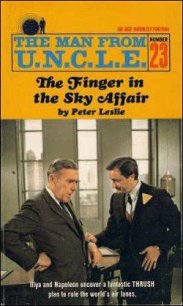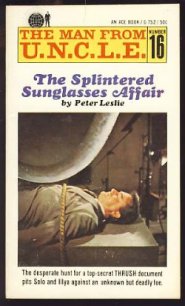[The Girl From UNCLE 04] - The Cornish Pixie Affair - Leslie Peter (читать книги полностью без сокращений бесплатно .TXT) 📗
Ernie Bosustow was wrestling with the wheel, steering the bucking whaler up and down the gigantic seas like a man on a roller-coaster. "...old petrol tin... stern thwart... fast as you..." she heard him shout.
She found a two-gallon can with the top sawn off under the rear seat, and began frenziedly dipping and throwing, dipping and throwing, as they ploughed on into the gale. The next half hour was sheer nightmare. As soon as they were far enough out to clear the reefs, they had to circle round and run back before the wind, with the great combers, marbled grey and gold by the moon, sweeping past on either side. The whaler, squatting low in the water now that she was half awash, alternately buried her nose and her stern in the crests as the twin screws — now labouring, now racing as they lifted clear of the sea — slogged remorselessly on. Many times, as they sank endlessly into some trough, she was sure they would never rise again; many times, as the boat shuddered to the onslaught of an extra large wave, she was certain it would disintegrate.
But at last she realised that the buffeting had resolved itself into a simple — if extensive — up and down motion; the shriek of the wind had died down to a whistle. She looked up from her back-breaking task. They were quite close in under the cliffs — she could make out their dark outline against the sky. Distantly to either side, she could hear the thunder of surf. She could even make out the pulsing line of phosphorescence where the rollers dashed themselves against the rocks. But straight ahead, in the freak area of slack water the boy had told her about, the sea simply rose and fell, sucking at the strata.
She continued to bail. The boat was now riding lighter in the water, but there was still a good deal aboard.
A moment later, aware of some subtle variation in the atmosphere around them, she straightened as they were carried swiftly forward, relapsed, and then surged on again, apparently straight at the cliff. There was a sudden acceleration, a pouring down of darkness as the moon and stars were extinguished — and then a slow spreading of unearthly green light as they floated out into the middle of an enormous cavern. The whaler had pierced the cliff to reach the Keg-Hole!
Ernie shouted something triumphant but unintelligible — she could not hear what it was because the first syllable he uttered was caught up to echo a hundredfold in the vast chimney of rock above them, distorted and magnified as it crashed around the galleries of dripping stone to merge with the suck and slap and drip of the water and the muffled roaring of the wind above.
There were no waves in the cavern, but the boat rose and fell sickeningly as the water ebbed and flowed — there must be an amplitude of eight or nine feet, April thought, as she peered at a weed-slimed ledge which kept sinking into view as the craft reached the zenith of its climb.
The boy scrambled up on to the covered bow and shouted something again. She saw he was going to try and jump on to the ledge. Three times he fended the boat off, leaning desperately against the slippery rock as it slithered past his hands. On the fourth rise, he launched himself at the side of the cavern, cleared the lip of the shelf and landed on his hands and knees. The next time the boat rose, he was on his feet, beckoning April to follow.
The thrust from Ernie's feet as he jumped had pushed the whaler away from the wall and she had to wait several ups and downs before it had drifted near enough for her to try. Then on the next rise some subterranean current tugged the stern outwards and the bows crunched against the side, jarring the craft from end to end and casting April to the curved decking. As the sea fell away and the boat dropped once more, the gun wale dragged down the face of the rock with a splintering of timber and three of the ropes tethering padded fenders to her sides parted. Yet again the weathered planking smashed into the rock as the ledge sank into the girl's line of vision. With raw and scraped hands, she attempted to keep them apart, but the old boat was too heavy and the swell inexorably nudged her against the wall of the cave. Somewhere up in the bows she could hear water pouring into the sail-locker, swelling the load that swilled ceaselessly from side to side of the cockpit.
The boy was crouched in the dim light on the edge of the shelf, waiting for her with outstretched hands. On the next rise, she gathered herself as the shattered bows lurched up and jumped.
Ernie seized her wrists and threw himself backwards, pulling her down on top of him just as her boot was slipping on the slimy weed.
Panting, she clambered to her feet and looked around her. The cavern was immense; she couldn't estimate how far across. Forty or fifty feet above their heads, the rock strata closed in, narrowing the roof to a shaft, at the top of which, improbably, the moon rode in a patch of sky. And it was the moonlight, reflected and refracted from scores of pale out crops and veins and galleries in this dark chimney, which pierced the gloom with a thousand glittering points of light and flooded the surface of the water with its strange radiance.
"Come on, then," Ernie Bosustow was whispering in her ear. "Let's get up them stairs! You got that flashlight?"
April produced the powerful torch she had snatched from the table before they left the caravan and handed it over. "What about the boat?" she asked. "And why do we have to whisper?"
"Because sound carries like mad in here and we don't know where your friends may be. Because, anyway, if we talk naturally, the echo smashes up and swells the noise so much that you can't understand a ruddy word... and as for the boat…" She saw him shrugging. "... There's nothing to be done."
"But what did you do when you came here as kids? What did the smugglers do?"
"Went back through the tunnel and stood off until someone signalled it was time to come in again. Or, if it was very calm, left two or three in the craft to fend off. Only other thing is to drop a sea anchor and leave her in the middle — and we don't have one aboard."
"How deep is the water in here?"
"They do say eighty fathoms — but nobody's ever really found out."
"Don't you mind about the boat? I mean…"
The boy shrugged again. "She was Harry's boat. Using her to pay off his killers seems... well... right, And if she dies in the attempt — well, again, that's better'n any other way." He switched on the flashlight.
Lancing the gloom, the beam illuminated a circle of dark rock, dripping with bright green weed. As he jerked it sideways, the shaft lit up a narrow flight of stairs carved into the wall of the cave and spiralling upwards towards the chimney and the patch of sky above. They began to climb.
As they rose, the torchlight moving around the walls of the cave picked out the sparkling veins of quartz and felspar and other minerals which writhed through the rock to make the pale and glittering contrasts they had observed from below.
They had climbed perhaps forty feet, and the steps carved in the rock were no longer wet and slippery, when the hoarse booming of the swell lapping the basin below — which sounded oddly like the respiration of some great subterranean beast — was interrupted by a splintering crunch which echoed around the shaft for what seemed like minutes.
"The boat!" April gasped. "Look!"
On the heaving surface of the water, green in the green luminescence of the cavern, they saw the whaler being lifted and smashed against a spur of rock on the far side from the shelf where they had landed. As the water subsided, the boat half caught on the projection, hung crazily for a moment, and then plunged back into the swell with a splash, its reverberations hurting their ears. For a second longer, it remained on the surface — and then gently it tilted up on its bows and slid beneath, leaving only a single plank eddying on the pale water...




![[The Girl From UNCLE 01] - The Global Globules Affair - Latter Simon (е книги .txt) 📗](/uploads/posts/books/56868/56868.jpg)